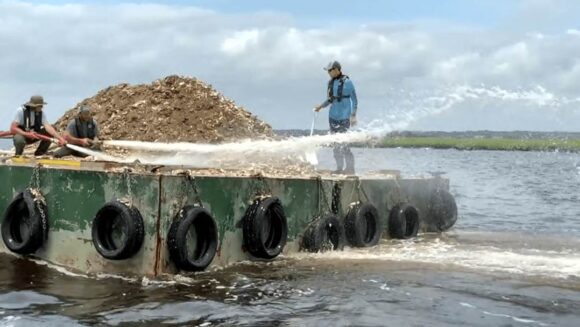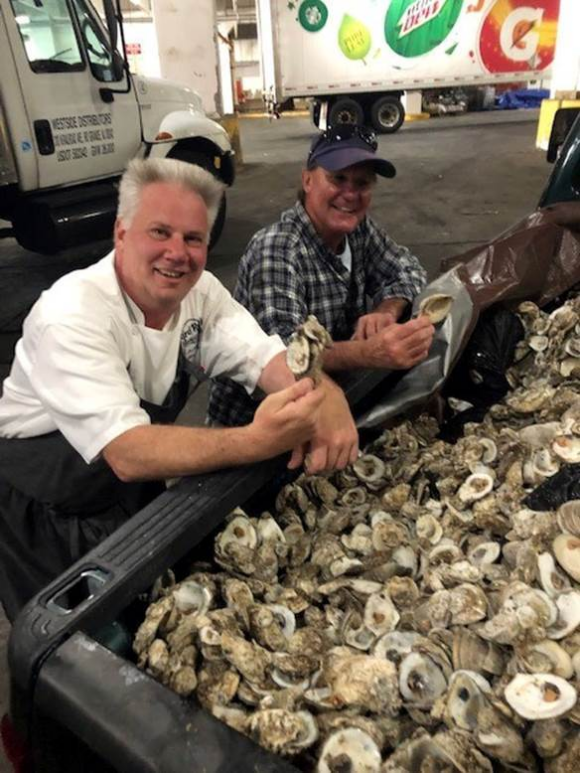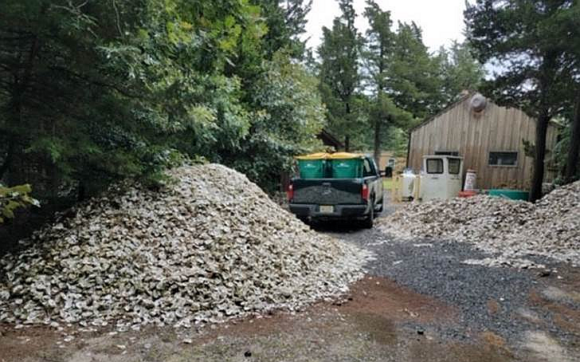
Recycled oyster shells being planted in the Mullica River by NJDEP biologists. Photo: NJDEP.
By Doug Zemeckis, Rutgers Cooperative Extension
Oysters are found in New Jersey’s bays and rivers throughout much of the state. There are several different species of oysters around the world, but the species that we have here in New Jersey is the Eastern (or American) oyster (Crassostrea virginica). Our wild oyster populations are now a small fraction of what they were before major declines from overharvesting, diseases, and changes in our marine ecosystems. This has contributed to a shift towards increased farming (i.e., aquaculture) of oysters to meet seafood demands and support industries in coastal communities.
Many efforts are ongoing throughout New Jersey, as well as around the US and worldwide, to help restore depleted oyster populations. Increased oyster populations would provide shellfish for harvesting and human consumption, while also aiding in improving coastal habitats. Oysters, as well as other shellfish species, provide many ecosystem services to marine habitats, such as filtering the water when feeding on algae and mitigating erosion and providing habitat for other species when oysters grow in reefs.
Oyster larvae need hard surfaces to settle on to survive where they then remain for the rest of their lives. Ideally, the shells of other live or dead oysters are available on which oyster larvae can settle. However, due to declines in wild oyster populations, there is limited habitat available for oyster larvae to settle on and expand their numbers.

Shells being recycled from the Hard Rock Casino in Atlantic City in 2019. Photo: Jeffrey Silady.

A pile of oyster shells curing at the Stockton University Marine Field Station before later being planted in the Mullica River Photo: Jeffrey Silady.
To provide these surfaces, work is expanding in New Jersey to recycle shells that would otherwise be destined for landfills. These recycling programs are partnering with a variety of different restaurants, casinos, and citizens to harvest shells after human consumption. Once collected, the shells are cured on land for at least six months so that any bacteria or diseases will die before being responsibly and securely planted into our coastal waterways. The recycled shells are planted in strategic locations where oyster larvae could settle on these shells and form oyster reefs. In some instances, oyster larvae from aquaculture hatcheries are put into tanks that contain seawater and recycled shells so that these larvae are set as “spat on shell”, thereby giving nature a head start by already having larvae on the shells before being planted.
The first of these recycling programs in New Jersey, known as the Oyster Recycling Program, partners primarily with restaurants on or near Long Beach Island and is led by Long Beach Township in collaboration with the Jetty Rock Foundation, Stockton University, Parsons Mariculture, and several other local partners. You can learn more about this program, including identifying participating restaurants and finding out about volunteer opportunities, by visiting their “Follow The Shell” webpage or contacting Angela Andersen, recycling/sustainability director, Long Beach Township: andersen@longbeachtownship.com, 609-361-6641.
The Bureau of Marine Habitats and Shellfisheries within the New Jersey Department of Environmental Protection (NJDEP) leads a shell recycling program in Atlantic City where shells are collected from restaurants and casinos throughout the city and are later planted in the Mullica River. Project partners include the Jetty Rock Foundation, Stockton University, and Rutgers Cooperative Extension. Additional information is available on the project’s webpage and can be obtained by contacting Scott Stueber, senior fisheries biologist with NJDEP: scott.stueber@dep.nj.gov, 609-748-2021.
The American Littoral Society recently started the “Shuck It, Don’t Chuck It!” Shell Recycling Program that is focusing on working with restaurants and citizen science drop-off locations in Monmouth County. More information about this program is available by contacting Kyle Patterson (program coordinator, kyle@littoralsociety.org) or Julie Schumacher (restoration coordinator, julie@littoralsociety.org).
These expanding shell recycling programs show great promise for aiding oyster and marine habitat restoration efforts throughout New Jersey. They also provide meaningful opportunities for citizens to get involved by volunteering, educating others about shellfish and marine ecology, supporting local businesses who are participating in recycling programs, or in a few (but increasing number of) cases by dropping off shells from shellfish they consume so that they can be properly handled and responsibly planted in the wild.
Editor’s Note: Rutgers marine extension agent Douglas Zemeckis has been collaborating on the NJDEP Shell Recycling program in Atlantic City since it started in 2019, with NJDEP taking on the primary responsibilities in the last few years. For any additional questions related to shell recycling, marine resource management, fisheries or aquaculture, reach Douglas Zemeckis at zemeckis@njaes.rutgers.edu, 732-349-1152.

